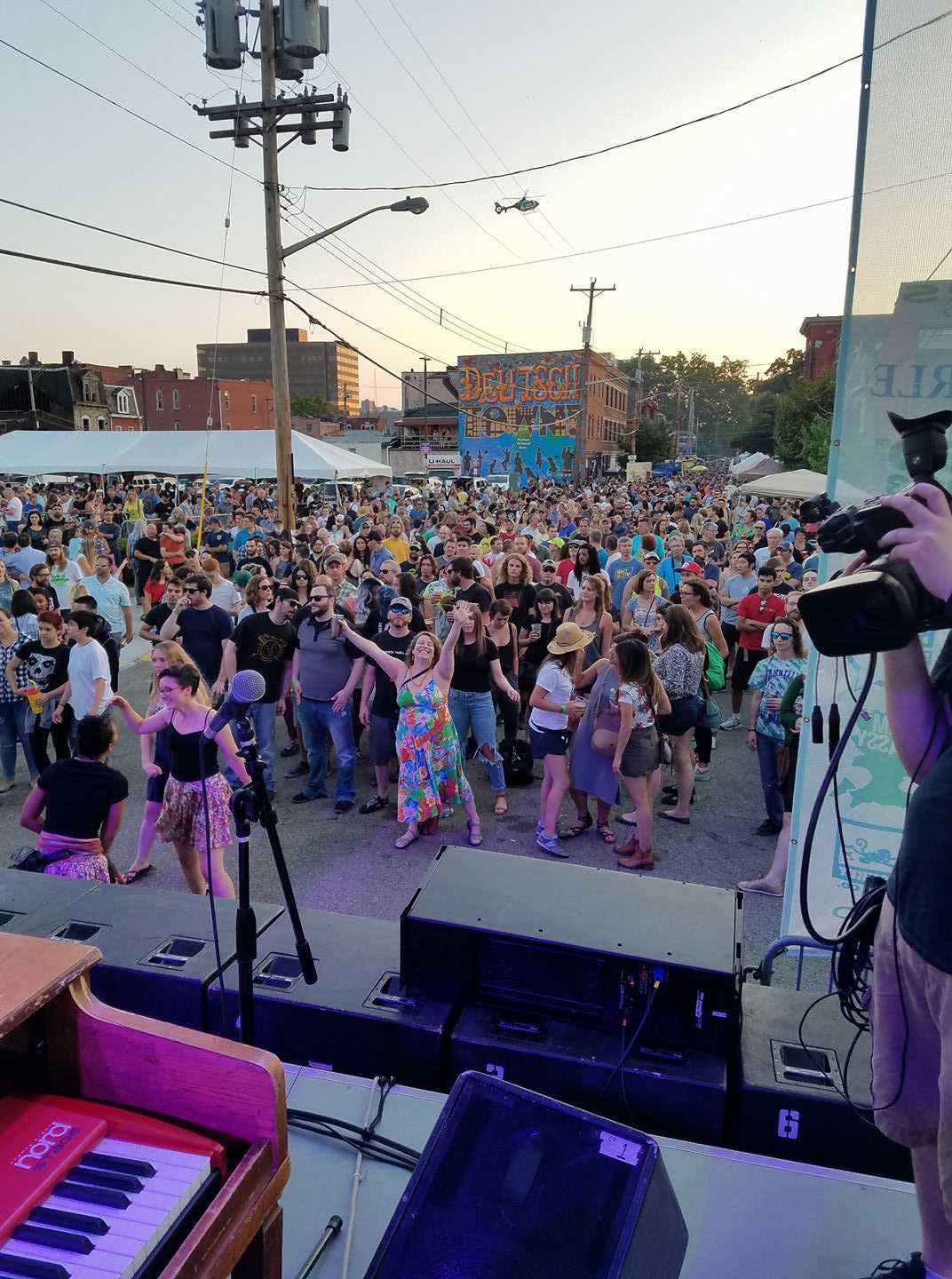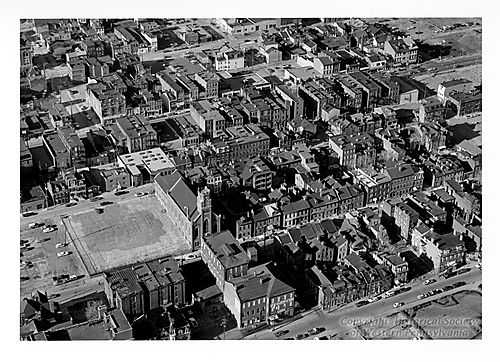Secret Pittsburgh
Music, Rainbows, and Community across the Allegheny
By Gabrielle Keane
The story of Deutschtown is a wonderful analogy for Pittsburgh itself: prosperous industry town falters, revives, and struggles. Though part of North Side, Deutschtown has maintained its individual identity as the areas around it have matured, gentrified, and developed into their own spaces. The area’s socio-economic patchwork varies greatly, including the lovely Mexican War Street Victorian remodels, colorful Randyland, and City of Asylum, along with dilapidated housing just off the main drag. While this mix heartens some, for others it provides looming questions of gentrification. Here I plan to explore the effects of economic decline and development on music and queer culture in North Side, particularly Deutschtown, as a way to see another side of Pittsburgh.
The community effort on behalf of Deutschtown is most powerfully illustrated through their web presence. Multiple sites, including North Side Leadership Conference, Allegheny City Historic Gallery, and Deutschtown, emphasize the economic opportunities available to investors, workers, and those seeking housing. As you can see in the “Aerial View of Deutschtown” photo, the area used to be nearly barren. The photo, which seems to be from the 1970s or 80s, provides a contrast to the modern. Through the years, however, this totalizing view has changed to include a thriving business district. The coordinated efforts of community organizations also include a new Deutschtown Summer Music Festival, with other year-round shows and concerts billed as well. Deutschtown’s cultural clout seems to have been greatly enhanced by this event, as it entices the city’s thriving music scene across the river. During Fall 2017, shows were held at Penn Brewery, a traditionally German historic brewery called E&O Brewery when it opened in 1885.
The cultural development is somewhat at odds with the overall economic development in the area. Recently, a local venue for jazz called James Street Gastropub and Speakeasy was forced to close after neighbors complained about noise. The old building, which the owners had attempted to renovate to include new insulation, windows, and air conditioning to mitigate the sound, was still too close to residential areas. Under threat of losing their liquor license and facing heavy fines, they instead decided to close their doors (Gigler). This kind of uneven economic development and zoning—one that allows a large bar and music venue to exist in close proximity to residential homes—is a symptom of Deutschtown and the North Side’s larger economic issues. With the large amount of money invested in the North Shore’s sports, music, and casino, cash flow to the area in the last fifteen years has changed dramatically. While not completely gentrified, Deutschtown has seen an influx of business activity that is outside the socio-economic status of the area around it. Troy Hill, which was separated from the rest of North Side after the construction of I-279, is particularly noted for its lack of similar economic development. Gentrification and corporatization becomes a serious question as the North Side Leadership Conference cites corporate support from local banks, health care networks, sports teams, and the casino (Corporate Partnerships). Transparency, though reassuring, does not change the large amount of influence these corporations have on an organization devoted to community development.
The North Side’s involvement with the city’s LGBT community has also been fraught with corporate influence of late. The Delta Foundation, Pittsburgh’s largest queer outreach organization, is housed just down the road from Allegheny Center. Its presence in the city since 1996 has included fundraising for community events and organizing the city’s Pride Fest. It takes place during the first week of June and coincides with the Three Rivers Arts Festival. This past year, Delta faced major criticism from smaller LGBTQ+ groups for giving the parade’s name rights to EQT Corporation: EQT Equality March. According to a Post-Gazette article on the controversy, activists were angered by the organization’s willingness to receive support from a fracking company. Fracking has been a large environmental issue in the region for years, though urban Pittsburghers do not feel its effects as acutely as rural folks do (Pineda). Additionally, EQT has donated to Pennsylvania Republican lawmakers like Tim Murphy, who mis-gendered Chelsea Manning in a statement in early 2017, and U.S. Rep Mike Kelly, who proposed a bill that could limit the adoption opportunities for LGBTQ+ people ("EQT Corp.").
This support may come at odds with Delta’s mission statement as they aim “to be a vigilant catalyst for change that produces increased opportunities and a high quality of life for the LGBT community in Western Pennsylvania” (Pittsburgh Pride). Delta chose not to disclose their spending for 2017’s PrideFest, but previous records indicate those numbers remain as much as 50% of the yearly operating budget. While PrideFest is a fun week for queer and straight Pittsburghers, it often caters to affluent, cisgender white gay men. While these people do represent a large contingent of the queer community, there are plenty of queer and trans people of color who need assistance finding jobs, affordable, housing, and identity-affirming healthcare (Pineda). Smaller activist organizations, like Queer PGH and SisTers, orchestrated People’s Pride this past year (Pineda). Their march started in Bloomfield and attempted to emphasize and amplify the voices of trans women of color.
Deutschtown’s own summer festival offers venues for LGBTQ acts and fans to gather and celebrate. With acts like Dinosoul and Jess Klein, the festival’s organization has welcomed queer music on its stages, at venues like Arnold’s Tea House, Penn Brewery, and Pittsburgh Winery. These events allow queer artists to become part of the larger cultural scene in the area, without emphasis on their queerness. Opportunities for bigger, better gigs come from that kind of exposure. The “Deutschtown Music Fest” photo above is a great example of the community engagement this kind of event brings. In “Uses of Photography,” Berger asserts that the West’s economy has made all things “spectacle” through the use of the camera (Berger 59). While this assertion certainly rings true for larger scale corporate events, the memory associated with intimate community exchanges of art is only enhanced by photography.
The trend of corporate interests co-opting North Side’s community organizations looms larger as Pittsburgh submits its Amazon HQ2 bid. According to an interview with columnist James Stewart, he views Pittsburgh as the top choice for a second Amazon headquarters. Citing its ready-to-build sites, public transport and bike trails, and international airport, Stewart sees Pittsburgh as Amazon’s top pick (“NYT”). An Amazon bid comes at some cost, however, as that kind of powerful corporate interest may seize control of local community groups as well. The North Side and Deutschtown’s fraught economic development may face even more trouble if Amazon moves in by driving up housing costs, increasing traffic, and bringing new workers. As Stewart relates, the company’s main interest is in “ready-to-build” sites. The North Side was one of these ready-to-build sites only about fifteen years ago—so as Pittsburgh bids to accept a new economic interest, it may serve us well to look at the ways corporation and community have interacted just across the Allegheny.
Works Cited
Berger, John. “About Looking.” Secret Pittsburgh Class Handout, Fall 2017.
“Corporate Partnerships.” Pittsburgh's Northside, NLSC, 2017.
Deto, Ryan. “LGBTQ Advocates Say Federal Legislation Would Allow Religious Adoption Agencies to Discriminate.” Pittsburgh City Paper, Pittsburgh City Paper, 7 June 2017.
Deto, Ryan. “Southwestern Pennsylvania Congressman Tim Murphy Uses Male Pronoun When Referring to Chelsea Manning in Statement.” Pittsburgh City Paper, Pittsburgh City Paper, 19 January 2017.
“EQT Corp.” OpenSecrets.org, The Center for Responsive Politics, 2016, Web. 27 November 2017.
Gigler, Dan. “Feeling Unwelcome, James Street Speakeasy Owners to Close Up.” Pittsburgh Post-Gazette, PG Publishing, 18 Oct. 2017.
“NYT Columnist Reveals the Six Cities that are Frontrunners for Amazon’s New Headquarters.” CNBC, Youtube, 27 Oct. 2017, www.youtube.com/watch?v=DvvAimssNnw.
Pineda, Arturo. “People’s Pride Events Set as Alternative to PrideFest.” Pittsburgh Post-Gazette, 10 June 2017.
“Pittsburgh Pride- About.” Delta Foundation of Pittsburgh, Delta Foundation of Pittsburgh, www.pittsburghpride.org/about/. Web. Accessed 27 November 2017.

